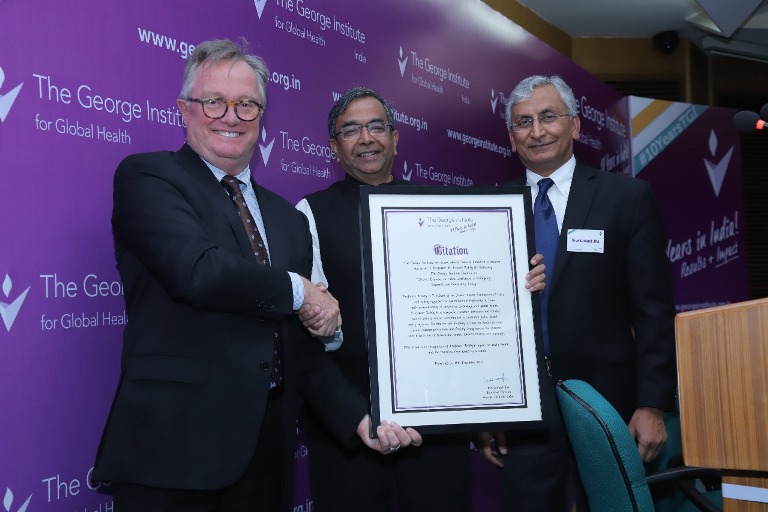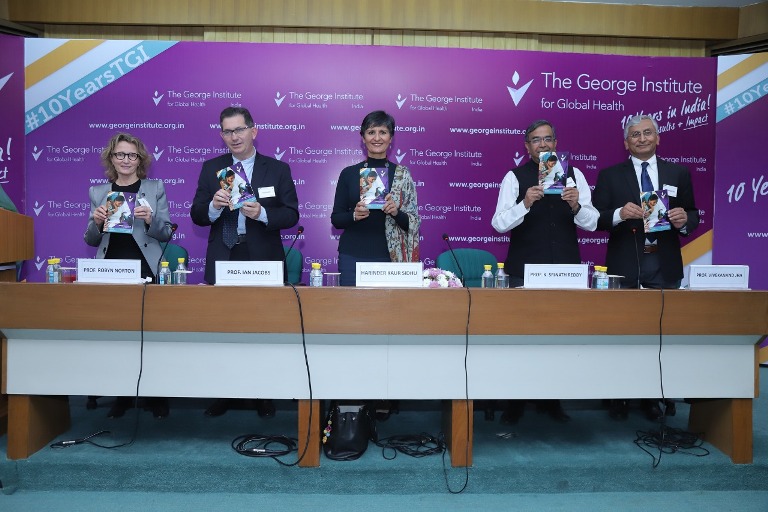
 New Delhi: The very first line of the Foreword to the book released by The George Institute of Global Health’s India chapter-Access to essential healthcare remains at best in progress, and at worst a distant dream, for billions across the world– succinctly sums up the case in India where healthcare system is chronically diseased.
New Delhi: The very first line of the Foreword to the book released by The George Institute of Global Health’s India chapter-Access to essential healthcare remains at best in progress, and at worst a distant dream, for billions across the world– succinctly sums up the case in India where healthcare system is chronically diseased.
The George Institute of Global Health’s India chapter may have emerged as an influential voice of research for impact, thanks to its seminal health research and innovations. But the milieu in which the health and medical research institute celebrated its 10th anniversary (December 15) of its actions in India did not allow rest on laurels.
The high level panel discussion on ‘Patient and Public participation in Healthcare Delivery’ was overshadowed by raging controversies around Fortis and Max hospitals. Speakers painted a grim picture of healthcare in India and underscored flaws plaguing it.
The celebration event was attended by a large range of stakeholders in healthcare research, policy, communication and delivery. A highlight of the event was an Oration delivered by Prof. K. Srinath Reddy, President of the Public Health Foundation of India and one of the few globally renowned healthcare policy experts.
Giving a sweeping overview of the evolution of cardiovascular and public health research in India over 50 years, and using examples from the work of several researchers, Dr Reddy, the architect of Universal Health Coverage (UHC) highlighted the progress made, described the scope of current and upcoming challenges, and reflected on possible solutions.

Dr Reddy averred that fiscal measures, policy decisions, multi-sectoral approach and reshaping the social and environmental determinants of health were going to be critical for healthcare delivery in the future. Indisciplinary research should provide meaningful information to policymakers, which can in turn influence policy.
He highlighted the importance of taking a life-course approach to addressing the problem of chronic diseases. Dr Reddy said:“We ought to be able to demonstrate even in a low resource setting on how technology-enabled frontline health workers can be competent and effective in detecting the common diseases and risk-factors like blood pressure & diabetes.The role of a health professional is to elucidate as a researcher, educate as a teacher, alleviate as a clinician, advocate as an activist and agitate as a concerned citizen. We all play one of these roles. If we can collectively discharge all these functions, we think we can minimize death and disability due to various diseases in India.”
The chief guest of the event, Ms Harinder Kaur Sidhu, Australian High Commissioner to India, congratulated the George Institute for a successful 10 years in India, and recognized the high quality work, adding that this could be the foundation for expanding the co-operation between the two countries.
The panel discussion on the topic of Patient and Public participation in Healthcare Delivery, was moderated by Prof. Ian Jacobs, Vice-Chancellor, UNSW Sydney. Dr Rajani Ved, Executive Director, National Health Systems Resource Centre; Ms K. Sujatha Rao, Former Secretary of Health and Family Welfare, Govt. of India; Dr Dinesh Arora, Director- Health, Niti Aayog; Dr Narottam Puri, Medical Advisor, Fortis Healthcare & Advisor Health Services FICCI and Mr Dinesh C Sharma, Managing Editor, India Science Wire were part of the panel discussion.
A number of contemporary issues covering a wide range of topics including patient participation in healthcare, lack of trust between doctors and patients and the role of the private sector were raised by the panellists and members of the audience. Important points that emerged was the need to increase conversation amongst members of the public around health care related issues, looking for long-term plans for disease prevention, ensuring adequate financing, developing sustainable delivery mechanisms and development of mechanisms to increase popular participation in healthcare planning.








